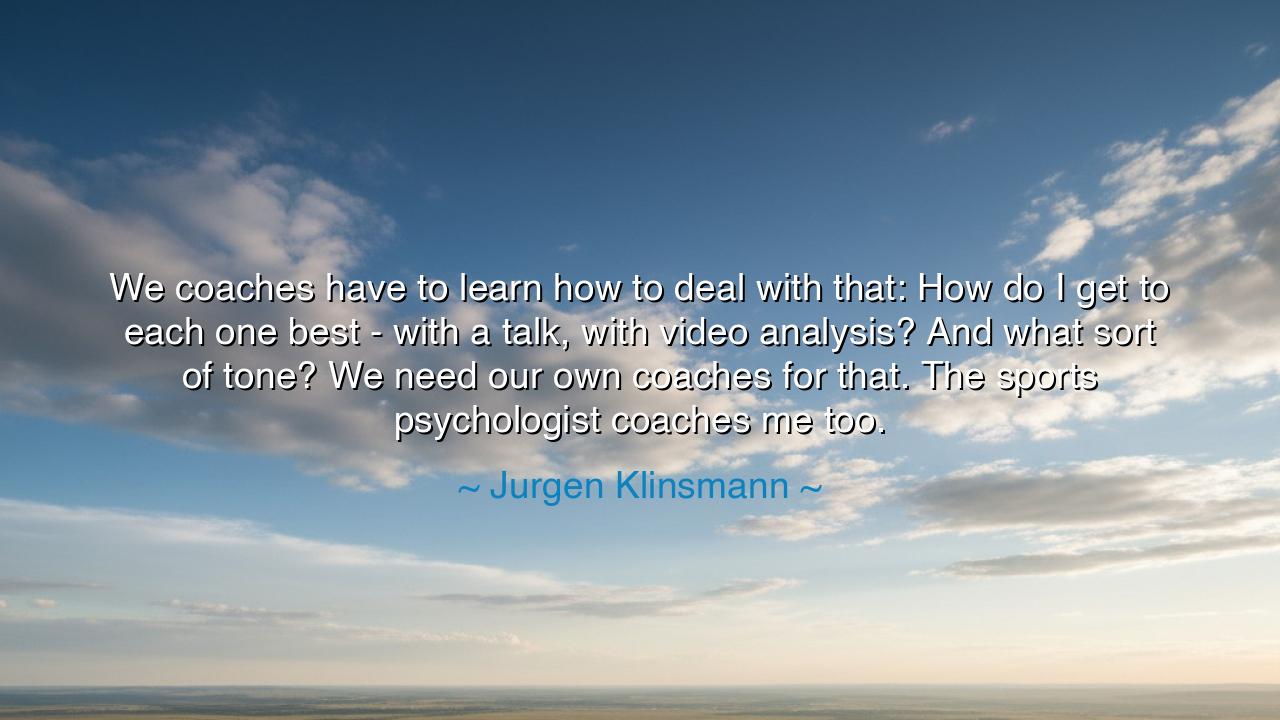
We coaches have to learn how to deal with that: How do I get to
We coaches have to learn how to deal with that: How do I get to each one best - with a talk, with video analysis? And what sort of tone? We need our own coaches for that. The sports psychologist coaches me too.






From the voice of Jürgen Klinsmann, a warrior of the field turned guide of men, comes this wisdom: “We coaches have to learn how to deal with that: How do I get to each one best – with a talk, with video analysis? And what sort of tone? We need our own coaches for that. The sports psychologist coaches me too.” At first hearing, these words may sound technical, the considerations of a trainer pondering his craft. But beneath them lies a deeper teaching: that leadership is not the art of commanding alone, but of listening, adapting, and forever learning.
When he asks, “How do I get to each one best?”, Klinsmann reveals the sacred duty of every leader: to understand the uniqueness of each soul under his care. Some are moved by stern rebuke, others by gentle encouragement. Some learn best through words, others through demonstration. To guide many is to become many; to reach each is to shape yourself anew with each encounter. A coach is not simply one voice shouting from the sideline, but a thousand voices, each chosen carefully for the ear that must hear it.
The mention of “talk, video analysis, tone” shows us that wisdom is not one weapon but many. Just as the smith forges different tools for different tasks, so too must the leader employ varied methods to shape the will of his players. Here, Klinsmann stands in the line of generals like Alexander, who knew when to inspire with speeches, when to show by example, and when to let silence carry weight. The true master of men does not cling to one method, but adapts, bends, and chooses the key that unlocks each heart.
Yet in his humility he adds, “We need our own coaches for that. The sports psychologist coaches me too.” Here lies the profound reversal: the leader himself admits his need for guidance. Too often the world imagines leaders as unteachable, as peaks who look down upon all others. But Klinsmann unmasks the illusion: even the guide must be guided, even the teacher must be taught, even the coach must be coached. This is not weakness, but the highest strength, for he who admits his need for growth ensures that his growth never ends.
History offers us another such figure: Marcus Aurelius, emperor of Rome, who, though crowned with absolute power, carried with him always the teachings of philosophers. He sought wisdom daily, writing in his Meditations not as one who had no more to learn, but as one striving ceaselessly to improve. Like Klinsmann, he knew that the throne—or the dugout—does not make a man perfect. It only makes him more responsible for his own improvement, for his failure will echo farther than his own life.
The essence of Klinsmann’s words is thus humility in leadership. To lead well, one must first confess: I do not know everything. I must learn how to speak to each soul, how to use each tool, how to refine my tone. And I, too, must be coached, for the leader who ceases to learn ceases to lead. His confession is not only his own truth but a model for all who bear responsibility over others.
Let the lesson be drawn for all who hear: if you are entrusted with leadership, whether in a family, a team, or a nation, do not seek to command only. Seek first to understand. Ask: How do I reach this one? What will open their heart? What tone will inspire rather than crush? And then, just as importantly, seek your own teachers, your own counselors, your own guides. For in receiving instruction, you become worthy to instruct.
Practically, let each soul take this action: cultivate humility and curiosity. Do not think yourself above learning. Find mentors who can sharpen you, whether through books, conversations, or counsel. And when guiding others, remember that no two hearts are alike. Adjust your voice, your method, your tone, until you reach them. In this way, like Klinsmann, you will not only lead others toward greatness—you will be led toward greatness yourself.
Thus his teaching endures: to lead is to learn, and to learn is to remain forever alive. The coach must be coached, the teacher must be taught, the leader must be led. And in this endless circle of humility and wisdom, true greatness is found.






AAdministratorAdministrator
Welcome, honored guests. Please leave a comment, we will respond soon